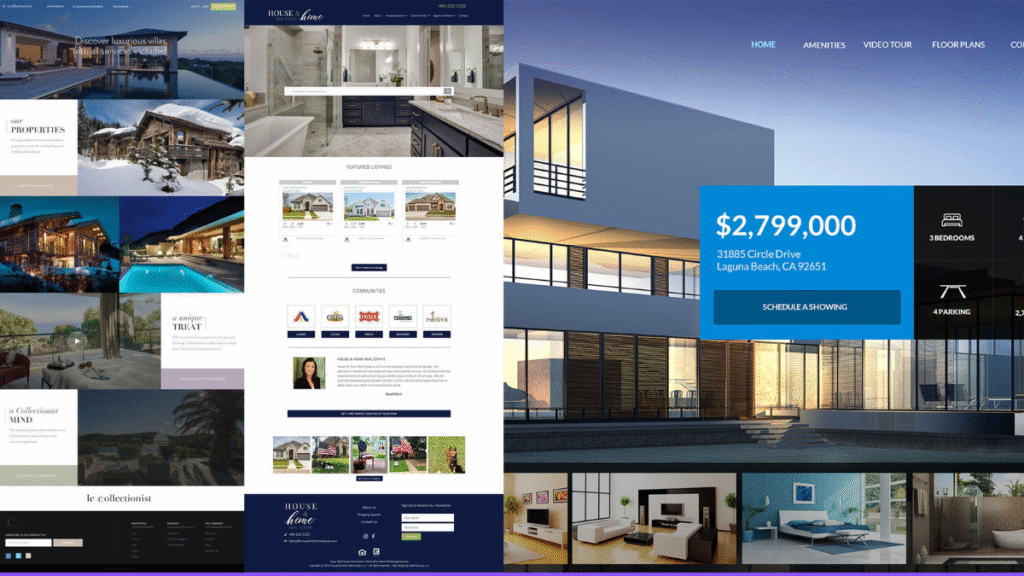Why Real Estate Website Design Matters
In today’s competitive property market, your website is more than just a digital business card—it’s your primary sales tool. The first interaction many buyers and sellers have with your real estate brand is online. A poorly designed website can make potential clients click away, while a strategically built real estate website design can showcase listings, generate leads, and establish trust.
With buyers increasingly starting their property search online, having a mobile-friendly, SEO-optimized, and user-focused website isn’t optional—it’s essential. Whether you’re an independent realtor, a real estate agency, or a property developer, the right website development and digital marketing strategy will help you stay ahead.
This article will break down everything you need to know about real estate website design, from essential features to SEO practices, design trends, and conversion strategies.
Key Elements of a High-Converting Real Estate Website
To stand out in the crowded digital space, your real estate website needs to combine functionality with aesthetics. Let’s explore the must-have elements that every property site should include:
1. Clean & Modern User Interface (UI)
Your website should look professional, trustworthy, and easy to navigate. Minimalist layouts, clear typography, and engaging visuals build confidence in visitors. A cluttered site often drives people away.
2. Mobile-Friendly & Responsive Design
More than 60% of property searches happen on mobile devices. A responsive design ensures that your listings, images, and forms look great on smartphones, tablets, and desktops.
3. Advanced Property Search & Filtering
Visitors should be able to filter properties by price, location, size, and type. Adding interactive maps and neighborhood guides makes the browsing experience more engaging.
4. High-Quality Visuals & Virtual Tours
Real estate is highly visual. Invest in professional photography, drone footage, and 360° virtual tours to give buyers an immersive experience before scheduling a showing.
5. Integrated Lead Capture Forms
Contact forms, “Schedule a Visit” buttons, and newsletter sign-ups should be strategically placed to convert visitors into leads.
6. SEO-Optimized Property Listings
Each listing should have unique descriptions, keywords, metadata, and schema markup so it ranks on search engines. Optimized listings attract organic traffic and serious buyers.
7. CRM & IDX Integration
A modern real estate site should connect seamlessly with IDX (Internet Data Exchange) to pull live property listings and integrate with CRM tools for managing leads efficiently.
The Role of Website Development in Real Estate Success
A real estate website isn’t just about design—it’s about functionality, speed, and scalability. Professional website development ensures that your site performs flawlessly.
Key Development Features:
- Fast Loading Speed: Slow sites increase bounce rates. Use optimized images, caching, and clean coding practices.
- Secure Hosting & SSL Certificates: Security builds trust and helps SEO ranking.
- Custom CMS Solutions: A content management system (like WordPress or custom-built platforms) allows agents to update listings easily.
- Integration with Digital Marketing Tools: From email automation to analytics tracking, development should support marketing strategies.

SEO for Real Estate Websites: Driving Organic Leads
Search Engine Optimization (SEO) is critical for generating consistent traffic. Without it, even the best-designed website won’t be discovered.
Real Estate SEO Best Practices:
- Keyword Research – Focus on location-based terms (e.g., “homes for sale in Miami”) and service-based terms (e.g., “real estate website design”).
- On-Page SEO – Optimize titles, meta descriptions, headings, and content for your target keywords.
- Local SEO – Claim your Google Business Profile, add NAP details (Name, Address, Phone) consistently, and encourage reviews.
- Content Marketing – Write blogs about real estate tips, market insights, and neighborhood guides to attract buyers organically.
- Technical SEO – Ensure fast page speed, XML sitemaps, clean URLs, and mobile responsiveness.
- Schema Markup – Add real estate-specific schema to improve visibility in search results.
Digital Marketing for Real Estate Websites
A high-converting real estate website design works best when combined with strong digital marketing strategies.
Digital Marketing Tactics That Work:
- Paid Ads (Google Ads & Social Media): Target people searching for properties in your area.
- Social Media Marketing: Showcase listings on Instagram, Facebook, and LinkedIn to build brand presence.
- Email Campaigns: Use automated email workflows to nurture leads.
- Video Marketing: Short property walkthroughs and testimonials boost engagement.
- Retargeting Ads: Remind visitors of properties they viewed to bring them back.
When web design, development, and marketing work together, your website becomes a lead-generation machine.
Design Trends in Real Estate Websites (2025 Edition)
To stay ahead, it’s important to adopt modern design trends that attract today’s digital-first buyers.
- Interactive Maps & Neighborhood Insights – Buyers want to explore nearby schools, restaurants, and amenities.
- AI-Powered Property Recommendations – Smart websites suggest similar listings based on browsing history.
- Minimalist & Clean Design – White space and simple layouts improve readability.
- Video Backgrounds & Virtual Staging – Enhance property appeal through engaging multimedia.
- Dark Mode Options – Growing in popularity for user comfort.
How a Well-Designed Website Converts Visitors into Clients
A beautiful website is useless unless it drives sales. Conversion optimization focuses on turning visitors into leads and clients.
Conversion Strategies for Real Estate Websites:
- Clear Call-to-Actions (CTAs): “Schedule a Tour,” “Get Property Alerts,” “Request a Valuation.”
- Trust Signals: Add testimonials, agent profiles, and certifications.
- Live Chat & Chatbots: Provide instant answers to visitors’ questions.
- Lead Magnets: Offer free market reports or buyer guides in exchange for emails.
- Analytics Tracking: Use tools like Google Analytics and heatmaps to understand user behavior.
Choosing the Right Partner for Real Estate Website Development
Not all website designers understand real estate. Partner with agencies or developers who specialize in real estate website development and understand IDX, MLS, and digital marketing integration.
When choosing a developer:
- Check their portfolio of real estate sites.
- Ensure they provide SEO and marketing support.
- Confirm they offer ongoing maintenance.
Conclusion: Invest in the Future of Your Real Estate Business
A well-designed real estate website is more than an online brochure—it’s the foundation of your entire digital presence. By combining sleek design, strong development, SEO strategies, and digital marketing, your site becomes a 24/7 lead generator.
Whether you’re an agent, broker, or property developer, investing in a professional real estate website design ensures you stay competitive, attract qualified leads, and close more deals.
In the digital-first era, your website is your strongest asset. Build it right—and it will become the cornerstone of your real estate success.
















